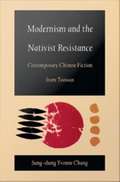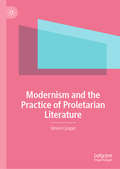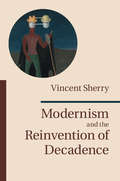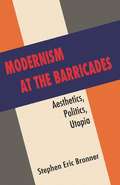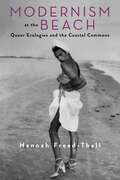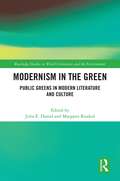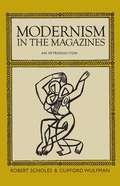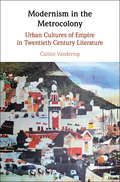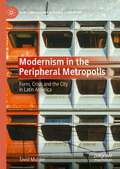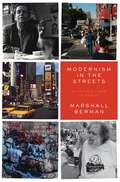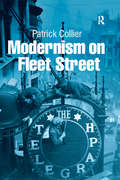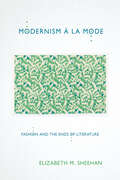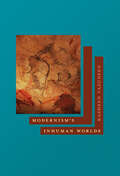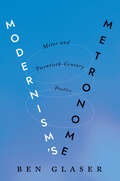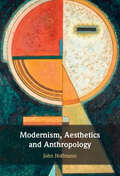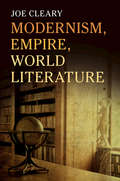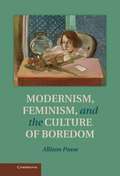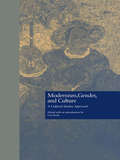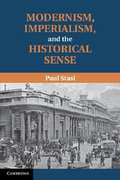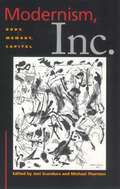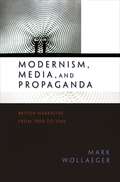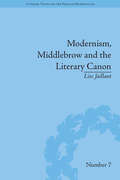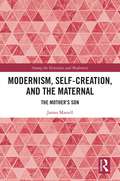- Table View
- List View
Modernism and the Nativist Resistance: Contemporary Chinese Fiction from Taiwan
by Sung-sheng Yvonne ChangThe first comprehensive English-language study of literary trends in the fiction of Taiwan over the last forty years, this pioneering work explores a rich tradition of literary Modernism in its shifting relationship with Chinese politics and culture. Situating her subject in its historical context, Sung-sheng Yvonne Chang traces the connection between Taiwan's Modernists and the liberal scholars of pre-Communist China. She discusses the Modernists' ambivalent relationship with contemporary Taiwan's conservative culture, and provides a detailed critical survey of the strife between the Modernists and the socialistically inclined, anti-Western Nativists. Chang's approach is comprehensive, combining Chinese and comparative perspectives. Employing the critical insights of Raymond Williams, Peter Burger, M. M. Bahktin, and Fredric Jameson, she investigates the complex issues involved in Chinese writers' appropriation of avant-gardism, aestheticism, and various other Western literary concepts and techniques. Within this framework, Chang offers original, challenging interpretations of major works by the best-known Chinese Modernists from Taiwan. As an intensive introduction to a literature of considerable quality and impact, and as a case study of the global spread of Western literary Modernism, this book will be of great interest to students of Chinese and comparative literature, and to those who wish to understand the broad patterns of twentieth-century literary history.
Modernism and the Practice of Proletarian Literature
by Simon CooperThis book tests critical reassessments of US radical writing of the 1930s against recent developments in theories of modernism and the avant-garde. Multidisciplinary in approach, it considers poetry, fiction, classical music, commercial art, jazz, and popular contests (such as dance marathons and bingo). Relating close readings to social and economic contexts over the period 1856–1952, it centers in on a key author or text in each chapter, providing an unfolding, chronological narrative, while at the same time offering nuanced updates on existing debates. Part One focuses on the roots of the 1930s proletarian movement in poetry and music of the nineteenth and early twentieth centuries. Part Two analyzes the output of proletarian novelists, considered alongside contemporaneous works by established modernist authors as well as more mainstream, popular titles.
Modernism and the Reinvention of Decadence
by Vincent SherryIn this major new book, Vincent Sherry reveals a fresh continuity in literary history. He traces the idea of decadence back to key events from the failures of the French Revolution to the cataclysm of the Great War. This powerful work of literary criticism and literary history encompasses a rich trajectory that begins with an exposition of the English Romantic poets and ends with a reevaluation of modernists as varied as W. B. Yeats, Henry James, Joseph Conrad. Rebecca West, Djuna Barnes, Samuel Beckett, and, centrally, Ezra Pound and T. S. Eliot. Sherry's hugely ambitious study will be essential reading for anyone working in modernist studies and twentieth-century literature more generally.
Modernism at the Barricades: Aesthetics, Politics, Utopia (Columbia Studies In Political Thought/Political History (coup))
by Stephen Eric BronnerStephen Eric Bronner revisits the modernist project's groundbreaking innovations, itsexperimental imagination, and its utopian politics. Reading the artistic and intellectual achievements of the movement's leading figures against larger social, political, and cultural trends, he follows the rise of a flawed yet salient effort at liberation and its confrontation with modernity.Modernism at the Barricades features chapters on expressionism, futurism, surrealism, and revolutionary art and includes fresh perspectives on the work of Arnold Schoenberg, Wassily Kandinsky, and Emil Nolde, among others. The volume illuminates an international avant garde intent on resisting bureaucracy, standardization, scientific rationality, and the increasing commodification of mass culture. Modernists sought new ways of feeling, new forms of expression, and new possibilities of experience while seeking to refashion society. Liberation was their aim, along with the invigoration of daily life—yet their process entangled political resistance with the cultural. Exploring both the political responsibility of the artist and the manipulation of authorial intention, Bronner reconfigures the modernist movement for contemporary progressive purposes and offers insight into the problems still complicating cultural politics. He ultimately reasserts the political dimension of developments often understood in purely aesthetic terms and confronts the self-indulgence and political irresponsibility of certain so-called modernists today. The result is a long overdue reinterpretation and rehabilitation of the modernist legacy for a new age.
Modernism at the Beach: Queer Ecologies and the Coastal Commons (Modernist Latitudes)
by Hannah Freed-ThallAt the beach, bodies converge with the elements and strange treasures come to light. Departing from the conventional association of modernism with the city, this book makes a case for the coastal zone as a surprisingly generative setting for twentieth-century literature and art. An unruly and elusive confluence of human and more-than-human forces, the seashore is also a space of performance—a stage for loosely scripted, improvisatory forms of embodiment and togetherness.The beach, Hannah Freed-Thall argues, was to the modernist imagination what mountains were to Romanticism: a space not merely of anthropogenic conquest but of vital elemental and creaturely connection. With an eye to the peripheries of capitalist leisure, Freed-Thall recasts familiar seaside practices—including tide-pooling, beachcombing, gambling, and sunbathing—as radical experiments in perception and sociability. Close readings of works by Marcel Proust, Virginia Woolf, Claude McKay, Samuel Beckett, Rachel Carson, and Gordon Matta-Clark, among others, explore the modernist beach as a queer refuge, a precarious commons, a scene of collective exhaustion and endurance, and a visionary threshold at the end of the world.Interweaving environmental humanities, queer and feminist theory, and cultural history, Modernism at the Beach offers new ways of understanding twentieth-century literature and its relation to ecological thought.
Modernism in Kyiv
by Irena Makaryk Virlana TkaczThe study of modernism has been largely focused on Western cultural centres such as Paris, Vienna, London, and New York. Extravagantly illustrated with over 300 photos and reproductions, Modernism in Kyiv demonstrates that the Ukrainian capital was a major centre of performing and visual arts as well as literary and cultural activity. While arguing that Kyiv's modernist impulse is most prominently displayed in the experimental work of Les Kurbas, one of the masters of the early Soviet stage, the contributors also examine the history of the city and the artistic production of diverse groups including Ukrainians, Russians, Jews, and Poles.Until now a silent presence in Western accounts of the cultural topography of modernism, multicultural Kyiv is here restored to its historical, intellectual, and artistic complexity. Excerpts taken from the works of artists, writers, and critics as well as the numerous illustrations help give life to the exciting creativity of this period. The first book-length examination of this subject, Modernism in Kyiv is a breakthrough accomplishment that will become a standard volume in the field.
Modernism in the Green: Public Greens in Modern Literature and Culture (Routledge Studies in World Literatures and the Environment)
by Julia E. Daniel Margaret KonkolModernism in the Green traces a trans-Atlantic modernist fascination with the creation, use, and representation of the modern green. From the verdant public commons in the heart of cities to the lookout points on mountains in national parks, planned green spaces serve as felicitous stages for the performance of modernism. In its focus on designed and public green zones,Modernism in the Green offers a new perspective on modernism’s overlapping investments in the arts, politics, urbanism, race, class, gender, and the nature-culture divide. This collection of essays is the first to explore the prominent and diverse ways greens materialize in modern literature and culture, along with the manner in which modernists represented them. This volume presents the idea of "the green" as a point of exploration, as our contributors analyze social-organic spaces ranging from public parks to roadways and refuse piles. Like the term "green," one that evokes both more-than-human natural zones and crafted public meeting places, these chapters uncover the social and spatial intersection of nature and culture in the very architecture of parks, gardens, buildings, highways, and dumps. This book argues that such greens facilitate modernists’ exploration of how nature can manifest in an era of increasing urbanization and mechanization and what identities and communities the green now enables or prevents.
Modernism in the Magazines: An Introduction
by Robert Scholes Clifford WulfmanIf modernism began in the magazines, as Robert Scholes and Clifford Wulfman argue, then the study of modern culture should begin with these publications. Scholes and Wulfman's radically inclusive approach not only considers the "little" modernist magazines alongside the "big" or mass magazines often dismissed as antithetical to modernism's elite culture, but also insists that scholars must investigate their contents as a whole--from poetry to advertising--to appreciate their full significance. The book's appendix also reprints a previously uncollected critique of popular British magazines from 1917 and 1918 by Ezra Pound.
Modernism in the Metrocolony: Urban Cultures of Empire in Twentieth-Century Literature
by Caitlin VandertopWhile literary modernism is often associated with Euro-American metropolises such as London, Paris or New York, this book considers the place of the colonial city in modernist fiction. From the streets of Dublin to the shop-houses of Singapore, and from the botanical gardens of Bombay to the suburbs of Suva, the monumental landscapes of British colonial cities aimed to reinforce empire's universalising claims, yet these spaces also contradicted and resisted the impositions of an idealised English culture. Inspired by the uneven landscapes of the urban British empire, a group of twentieth-century writers transformed the visual incongruities and anachronisms on display in the city streets into sources of critique and formal innovation. Showing how these writers responded to empire's metrocolonial complexities and built legacies, Modernism in the Metrocolony traces an alternative, peripheral history of the modernist city.
Modernism in the Peripheral Metropolis: Form, Crisis and the City in Latin America (New Comparisons in World Literature)
by Tavid MulderThis book shows how Latin American writers and artists in the crisis-decades of the 1920s and 1930s used modernist techniques to explore national issues in relation to global capitalism. Drawing on a rich interdisciplinary archive of novels, poetry, essays, photography, and architecture, it includes chapters on major figures and the transformations that marked Latin American cities at the beginning of the twentieth century: the poet Manuel Maples Arce and Mexico City; the essayist José Carlos Mariátegui and Lima; the novelist Roberto Arlt and Buenos Aires; the novelist Patrícia Galvão and São Paulo. Tavid Mulder argues that the Latin American city should be understood as a peripheral metropolis: a social space that is simultaneously peripheral relative to the center of the world economy and a metropolis in relation to the region’s vast, underdeveloped hinterlands. Conceiving of modernist techniques as ways of understanding how the dualisms of Latin American societies—urban and rural, wealth and poverty, cosmopolitan and national—are bound together by the internal contradictions of capitalism, this volume insists on the ability of literary and artistic works to grasp the process through which untenable situations of crisis are not overcome but stabilized in the periphery. It thereby sheds light on issues in Latin America that have become increasingly urgent in the twenty-first century: inequality, indigenous migration, surplus populations, and anomie.
Modernism in the Streets: A Life and Times in Essays
by Marshall Berman David Marcus Shellie SclanEssays tracing the intellectual life of a quintessential New York City writer and thinkerMarshall Berman was one of the great urbanists and Marxist cultural critics of the twentieth and twenty-first centuries, and his brilliant, nearly sui generis book All That Is Solid Melts Into Air is a masterpiece of the literature on modernism. But like many New York intellectuals, the essay was his characteristic form, accommodating his multifarious interests and expressing his protean, searching exuberant mind. This collection includes early essays from and on the radical ’60s, on New York City, on literary figures from Kafka to Pamuk, and late essays on rock, hip hop, and gentrification. Concluding with his last essay, completed just before his death in 2013, this book is Berman’s intellectual autobiography, tracing his career as a thinker through the way he read the “signs in the street.””
Modernism on Fleet Street
by Patrick CollierBritish modernism came of age at a time of great cultural anxiety about the state of journalism. The new newspapers, with their brief, flashy articles, striking visuals, hyperbolic headlines, and sensational news, stood at the center of debates about reading in the period, seeming to threaten the viability of representative democracy, the health and vitality of the language, and the very future of literature itself. Patrick Collier's study brings an impressive array of archival research to his exploration of modernism's relationship to the newspaper press. People who sought to make their way as writers could neither remain neutral on this issue nor abandon journalism, which offered an irreplaceable source of income and self-advertisement. Collier discusses five modern writers-T. S. Eliot, James Joyce, Virginia Woolf, Rebecca West, and Rose Macaulay-showing how their work takes part in contemporary debates about journalism and examining the role journalism played in establishing their careers. In doing so, he uncovers tensions and contradictions inherent in the identity of the 'serious artist' who relied on the ephemeral forms of journalism for money and reputation.
Modernism à la Mode: Fashion and the Ends of Literature
by Elizabeth M. SheehanModernism à la Mode argues that fashion describes why and how literary modernism matters in its own historical moment and ours. Bringing together texts, textiles, and theories of dress, Elizabeth Sheehan shows that writers, including Virginia Woolf, D.H. Lawrence, W.E.B. Du Bois, Nella Larsen, and F. Scott Fitzgerald, turned to fashion to understand what their own stylized works could do in the context of global capital, systemic violence, and social transformation. Modernists engage with fashion as a mood, a set of material objects, and a target of critique, and, in doing so, anticipate and address contemporary debates centered on the uses of literature and literary criticism amidst the supposed crisis in the humanities. A modernist affect with a purpose, no less.By engaging modernism à la mode—that is, contingently, contextually, and in light of contemporary concerns—this book offers an alternative to the often-untenable distinctions between strong or weak, suspicious or reparative, and politically activist or quietist approaches to literature, which frame current debates about literary methodology. As fashion helps us to describe what modernist texts do, it enables us to do more with modernism as a form of inquiry, perception, and critique. Fashion and modernism are interwoven forms of inquiry, perception, and critique, writes Sheehan. It is fashion that puts the work of early twentieth-century writers in conversation with twenty-first century theories of emotion, materiality, animality, beauty, and history.
Modernism's Inhuman Worlds
by Rasheed TazudeenModernism's Inhuman Worlds explores the centrality of ecological precarity, species indeterminacy, planetary change, and the specter of extinction to modernist and contemporary metamodernist literatures. Modernist ecologies, Rasheed Tazudeen argues, emerge in response to the enigma of how to imagine inhuman being—including soils, forests, oceans, and the earth itself—through languages and epistemologies that have only ever been humanist. How might (meta)modernist aesthetics help us to imagine (with) inhuman worlds, including the worlds still to be made on the other side of mass extinction? Through innovative readings of canonical and emergent modernist and metamodernist works, Tazudeen theorizes inhuman modernism as a call toward further receptivity to the worlds, beings, and relations that tend to go unthought within Western humanist epistemologies. Modernist engagements with the figures of enigma, riddle, and metaphor, according to the book's central argument, offer a means toward what Franz Kafka calls an "otherwise" speaking, based on language's obliqueness to inhuman and planetary being. Drawing on ecocriticism, decolonial and feminist science studies, postcolonial theory, inhuman geography, and sound studies, Tazudeen analyzes an inhuman modernist lineage—spanning from Darwin, Carroll, and Flaubert, through Joyce, Kafka, and Woolf, to contemporary poetic works—as both part of a collaborative rethinking of modernism's planetary and inhuman aesthetics, as well as occasions for imagining new modes of livingness for the extinctions to come.
Modernism's Metronome: Meter and Twentieth-Century Poetics (Hopkins Studies in Modernism)
by Ben GlaserDespite meter's recasting as a rigid metronome, diverse modern poet-critics refused the formal ideologies of free verse through complex engagements with traditional versification.In the twentieth century, meter became an object of disdain, reimagined as an automated metronome to be transcended by new rhythmic practices of free verse. Yet meter remained in the archives, poems, letters, and pedagogy of modern poets and critics. In Modernism's Metronome, Ben Glaser revisits early twentieth-century poetics to uncover a wide range of metrical practice and theory, upending our inherited story about the "breaking" of meter and rise of free verse.
Modernism, Aesthetics and Anthropology
by John HoffmannJohn Hoffmann argues that a combination of aesthetics and anthropology allowed modernist writers to challenge social hierarchies they associated with the nineteenth century. He shows how Enlightenment philosophers synthesized the two discourses and how modernists working in the early twentieth century then took up this synthesis to dispute categories of social difference that had been naturalized, and thus legitimized, by pre-evolutionary and Darwinian anthropological theories. The book brings a range of new insights to major topics in modernist studies, revealing neglected continental sources for Irish anti-colonialism, the aesthetic contours of Zionism in the era of Mandatory Palestine, and the influence of German idealism on critiques of racism following World War I. Working over a long historical durée, Hoffmann surveys the ways aesthetics has been used, and misused, to construct and contest social hierarchies grounded in anthropological distinctions.
Modernism, Empire, World Literature
by Joe ClearyAfter World War I, American, Irish and then Caribbean writers boldly remade the world literary system long dominated by Paris and London. Responding to literary renaissances and social upheavals in their own countries and to the decline of war-devastated Europe, émigré and domestic-based writers produced dazzling new works that challenged London's or Paris's authority to fix and determine literary value. In so doing, they propounded new conceptions of aesthetic accomplishment that were later codified as 'modernism'. However, after World War II, an assertive American literary establishment repurposed literary modernism to boost the cultural prestige of the United States in the Cold War and to contest Soviet conceptions of 'world literature'. Here, in accomplished readings of major works and essays by Henry James, Ezra Pound, W. B. Yeats, T. S. Eliot, James Joyce, F. Scott Fitzgerald, Eugene O'Neill and Derek Walcott, Joe Cleary situates Anglophone modernism in terms of the rise and fall of European and American empires, changing world literary systems, and disputed histories of 'world literature'.
Modernism, Feminism, and the Culture of Boredom
by Allison PeaseBored women populate many of the most celebrated works of British modernist literature. Whether in popular offerings such as Robert Hitchens's The Garden of Allah, the esteemed middlebrow novels of May Sinclair or H. G. Wells, or now-canonized works such as Virginia Woolf's The Voyage Out, women's boredom frequently serves as narrative impetus, antagonist and climax. In this book, Allison Pease explains how the changing meaning of boredom reshapes our understanding of modernist narrative techniques, feminism's struggle to define women as individuals and male modernists' preoccupation with female sexuality. To this end, Pease characterizes boredom as an important category of critique against the constraints of women's lives, arguing that such critique surfaces in modernist fiction in an undeniably gendered way. Engaging with a wide variety of well- and lesser-known modernist writers, Pease's study will appeal especially to researchers and graduates in modernist studies and British literature.
Modernism, Gender, and Culture: A Cultural Studies Approach (Wellesley Studies in Critical Theory, Literary History and Culture #Vol. 11)
by Lisa Rado"First Published in 1997, Routledge is an imprint of Taylor & Francis, an informa company."
Modernism, Imperialism and the Historical Sense
by Paul StasiModernist art and literature sought to engage with the ideas of different cultures without eradicating the differences between them. In Modernism, Imperialism and the Historical Sense, Paul Stasi explores the relationship between high modernist aesthetic forms and structures of empire in the twentieth century. Stasi's text offers new readings of James Joyce, Ezra Pound, T. S. Eliot and Virginia Woolf by situating their work within an early moment of globalization. By combining the insights of Marxist historiography, aesthetic theory and postcolonial criticism, Stasi's careful analysis reveals how these authors' aesthetic forms responded to, and helped shape, their unique historical moment. Written with a wide readership in mind, this book will appeal especially to scholars of British and American literature as well as students of literary criticism and postcolonial studies.
Modernism, Inc.: Body, Memory, Capital (Cultural Front)
by Jani Scandura Michael ThurstonDrawing on a variety of interdisciplinary debates in cultural studies and contemporary theory, Modernism, Inc. provides a new look at the relationship between modernism and postmodernism within the critical frame of twentieth-century American culture. Organized around the idea of "incorporation"--embodiment, repressed memory, and advanced capitalism--Modernism, Inc. covers a wide range of topics: Josephine Baker's "hot house style"; the president's penis in American political life; myth-making and the Hoover Dam; trauma, poetics, and the Armenian genocide; feminist kitsch and the recuperation of North America's "Great Lady painters"; Gertrude Stein and Jewish Social Science; the Reno Divorce Factory and the production of gender; Andy Razaf and Black Bolshevism. Collectively, the essays suggest that the relationship between the modern and the postmodern is not one of rupture, belatedness, dilution, or extremity, but of haunting. Modernism, Inc. looks at our ghosts, and at the unspeakable secrets of modernity from which they're derived. Contributors: Maria Damon, Walter Kalidjian, Walter Lew, Janet Lyon, William J. Maxwell, Cary Nelson, John Timberman Newcombe, David G. Nicholls, Thomas Pepper, Paula Rabinowitz, Daniel Rosenberg, Marlon Ross, Jani Scandura, Kathleen Stewart, Julia Walker.
Modernism, Male Friendship, And The First World War
by Sarah ColeSarah Cole examines the rich literary and cultural history of masculine intimacy in the twentieth century. Cole approaches this complex and neglected topic from many perspectives - as a reflection of the exceptional social power wielded by the institutions that housed and structured male bonds; as a matter of closeted and thwarted homoerotics; as part of the story of the First World War. Cole shows that the terrain of masculine fellowship provides an important context for understanding key literary features of the modernist period. She foregrounds such crucial themes as the over-determined relations between imperial wanderers in Conrad's tales, the broken friendships that permeate Forster's fictions, Lawrence's desperate urge to make culture out of blood brotherhood and the intense bereavement of the war poet. Cole argues that these dramas of compelling and often tortured male friendship have helped to define a particular spirit and voice within the literary canon.
Modernism, Media, and Propaganda: British Narrative from 1900 to 1945
by Mark WollaegerThough often defined as having opposite aims, means, and effects, modernism and modern propaganda developed at the same time and influenced each other in surprising ways. The professional propagandist emerged as one kind of information specialist, the modernist writer as another. Britain was particularly important to this double history. By secretly hiring well-known writers and intellectuals to write for the government and by exploiting their control of new global information systems, the British in World War I invented a new template for the manipulation of information that remains with us to this day. Making a persuasive case for the importance of understanding modernism in the context of the history of modern propaganda, Modernism, Media, and Propaganda also helps explain the origins of today's highly propagandized world. Modernism, Media, and Propaganda integrates new archival research with fresh interpretations of British fiction and film to provide a comprehensive cultural history of the relationship between modernism and propaganda in Britain during the first half of the twentieth century. From works by Joseph Conrad to propaganda films by Alfred Hitchcock and Orson Welles, Mark Wollaeger traces the transition from literary to cinematic propaganda while offering compelling close readings of major fiction by Virginia Woolf, Ford Madox Ford, and James Joyce.
Modernism, Middlebrow and the Literary Canon: The Modern Library Series, 1917–1955 (Literary Texts and the Popular Marketplace #7)
by Lise JaillantIn the 1920s and 1930s the Modern Library series began to bring out cheap editions of modernist works. Jaillant provides a thorough analysis of the series’ mix of highbrow and popular literature and argues that the availability and low cost of modernist works helped to expand modernism's influence as a literary movement.
Modernism, Self-Creation, and the Maternal: The Mother’s Son (Among the Victorians and Modernists)
by James MartellFocusing on their conception and use of the notion of the mother, Modernism, Self-Creation, and the Maternal proposes a new interpretation of literature by modernist authors like Rousseau, Baudelaire, Poe, Rimbaud, Rilke, Joyce, and Beckett. Seen through this maternal relation, their writing appears as the product of an "anxiety" rising not from paternal influence, but from the violence done to their mother in their attempts at self-creation through writing. In order to bring to light this modernist violence, this study analyzes these authors in tandem with Derrida’s work on the gender-specific violence of the Western philosophical and literary tradition. The book demonstrates how these writer-sons wrote their works in a constant crisis vis-à-vis the mother’s body as site of both origin and dissolution. It proves how, if modernism was first established as a patrilineal heritage, it was ultimately written on the bodies of women and mothers, confusing them in order to appropriate their generative traits.
